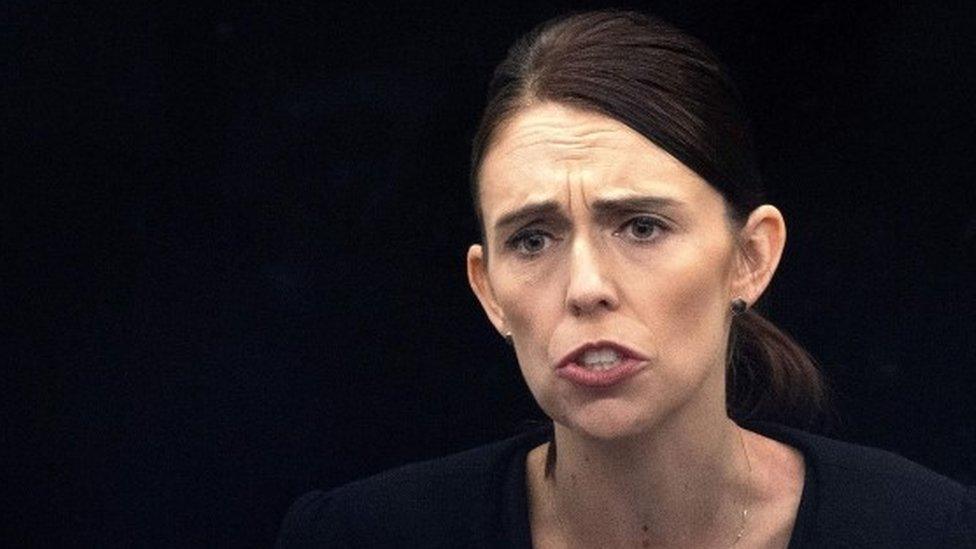Christchurch shootings: New Zealand falls silent for mosque victims
- Published
Imam Gamal Fouda, who was leading prayers, thanked the people of New Zealand "for their tears"
New Zealand has broadcast the Islamic call to prayer and observed a two-minute silence in ceremonies to mark a week since the Christchurch attacks.
Prime Minister Jacinda Ardern joined thousands of mourners near the Al-Noor mosque, one of two places of worship targeted in last Friday's shootings.
Imam Gamal Fouda, who led the prayers, said: "We are broken-hearted, but we are not broken."
Fifty people were killed and dozens more wounded in the attacks.
Australian Brenton Tarrant, a self-proclaimed white supremacist, has been charged with one murder and is expected to face further charges.
On Thursday Ms Ardern announced a ban on all types of semi-automatic weapons.
The victims have been remembered at events throughout the week
What is happening on Friday?
Thousands of people have gathered in Hagley Park, near the Al-Noor mosque, to mark Friday's national day of reflection for the victims.
The Muslim call to prayer, or adhan, was broadcast on national television and radio at 13:30 (00:30 GMT) and was followed by a two-minute silence.
In an address beforehand, Ms Ardern said: "New Zealand mourns with you, we are one."
"According to the Prophet Muhammad... the believers in their mutual kindness, compassion and sympathy are just like one body. When any part of the body suffers, the whole body feels pain."

Victims of the Christchurch shootings
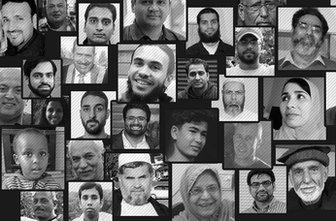

The Imam of Al-Noor mosque, Gamal Fouda, was there when the attack happened and said the gunman "broke the hearts of millions around the world".
"Today, from the same place, I look out and I see the love and compassion," he said.
"We are alive, we are together, we are determined to not let anyone divide us."
One observer, John Clark, said the message was profound: "People will be rethinking how they react, how they think, and how they speak sometimes - it's penetrated to that level of society.
"We like to think that we're a liberal community, but we know that there are dark parts," said Mr Clark, 72. "It will positively affect New Zealand and maybe we'll have even more to offer the world."
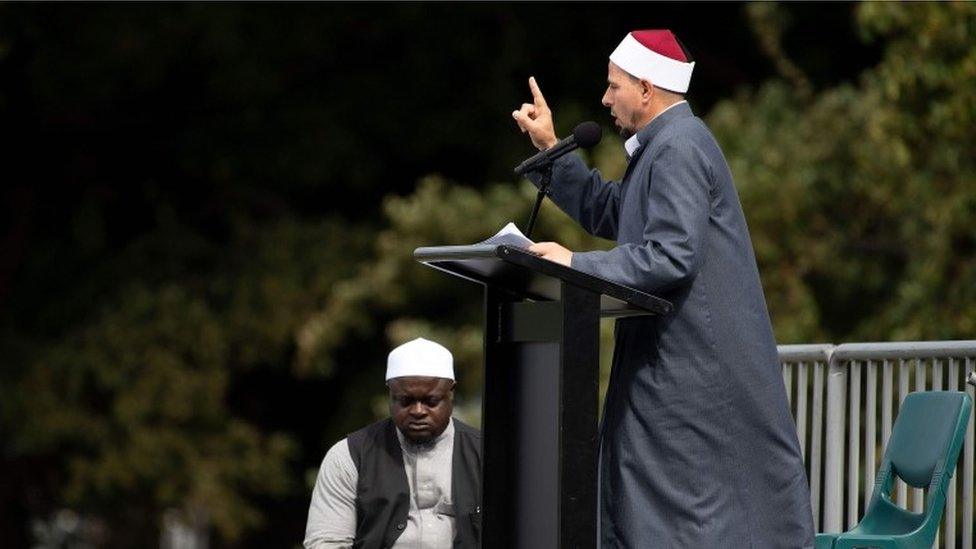
Imam Gamal Fouda delivered a sermon
Many mosques across the country are opening their doors to visitors, and human chains will be formed outside some in symbolic acts of protection and support.
A mass funeral is being held for 30 of the dead, including the youngest victim Mucaad Ibrahim, aged three , who was killed at the Al-Noor mosque.

At the scene
Howard Johnson, BBC News, Hagley Park, Christchurch
"I'm wearing this in solidarity today," said hairdresser Melody, pointing at a blue headscarf adorned with gold crucifixes.
Like thousands of others in the city of Christchurch, she's been struggling to come to terms with the horror of last week's attacks.
All week advertising hoardings have been beaming positive messages back onto the streets: "This isn't us", "Kia Kaha Christchurch" and "No room for racism here".
Friday was a chance for Christchurchers to bring those sentiments together in one place at the same time and to pay their respects to the dead.
People flocked from all corners of the city and flowers and messages of sympathy were laid at the foot of the park's towering oak trees.
A Maori biker gang gathered in the enclosure for Muslim prayers to offer their protection. One had a large red crucifix emblazoned on the back of his leather waistcoat. It felt symbolic of New Zealand's positive, multicultural response to the killings.
When the tributes were over people started pouring out of the park, back into the city and their everyday lives.
I approached Christine McCartney. She was born in the city in 1951 and has lived here her whole life. "It's all been deeply saddening," she told me, "but I feel positive about the way this has brought us all together."

Robin Molony: "In solidarity with the Muslim women, we are wearing our headscarves"
Earlier, Ms Ardern encouraged as many New Zealanders as possible to use the day to pause and reflect.
"I know many New Zealanders wish to mark the week that has passed since the terrorist attack and to support the Muslim community as they return to mosques," she said.
"How we choose to reflect during the silence will be different for each of us. Everyone should do what feels right for them, wherever they are - at home, at work, at school."
One social media campaign has urged non-Muslim women in New Zealand to wear a headscarf for the day.
Meanwhile, government officials worked into the night to prepare the mosque and the bodies of victims for a mass burial in Christchurch later on Friday.
One person who took part said: "All the bodies are washed. We finished around 1.30am. It was our duty. After we finished, there was a lot of emotion. People were crying and hugging."
What is the gun ban?
Ms Ardern announced a ban on all types of semi-automatic weapons and assault rifles following the Christchurch attacks.
She said she expected new legislation to be in place by 11 April, saying: "Our history changed forever. Now, our laws will too."
New Zealand's PM said she hoped the ban would be in place by 11 April
"Six days after this attack, we are announcing a ban on all military style semi-automatics (MSSA) and assault rifles in New Zealand," Ms Ardern said in a news conference.
"Related parts used to convert these guns into MSSAs are also being banned, along with all high-capacity magazines."
An amnesty has been imposed so the owners of affected weapons can hand them in, and a buy-back scheme will follow.
The buy-back could cost up to NZ$200m ($138m; £104m), but Ms Ardern said "that is the price that we must pay to ensure the safety of our communities".
Ms Ardern has also announced that a National Memorial Service for victims is being planned for next week.
- Published21 March 2019
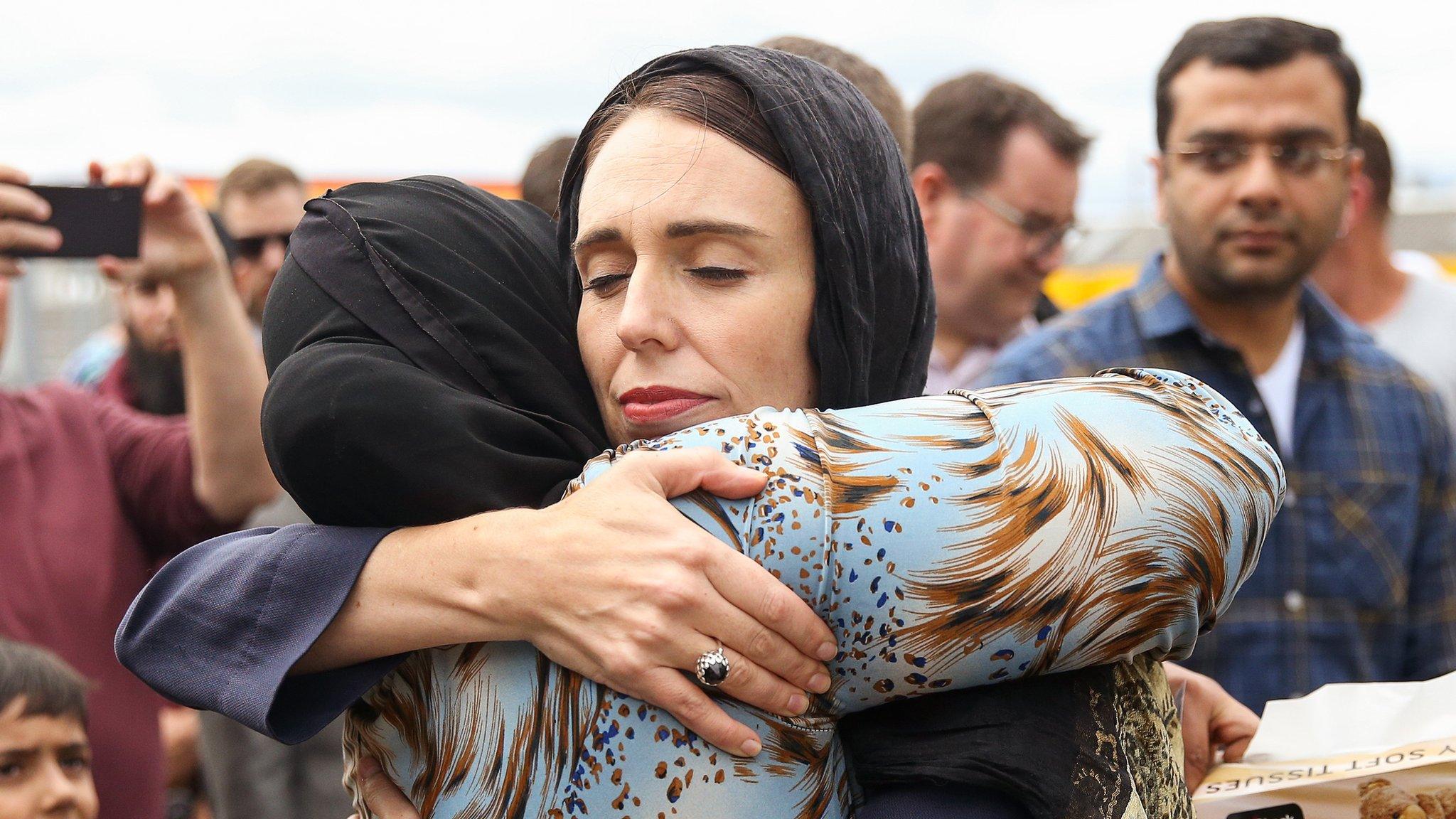
- Published21 August 2020
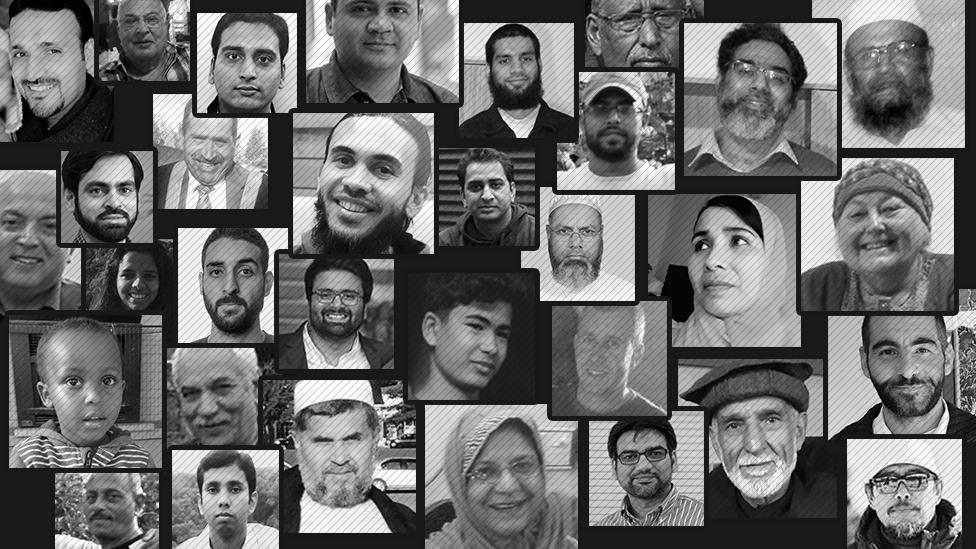
- Published21 March 2019
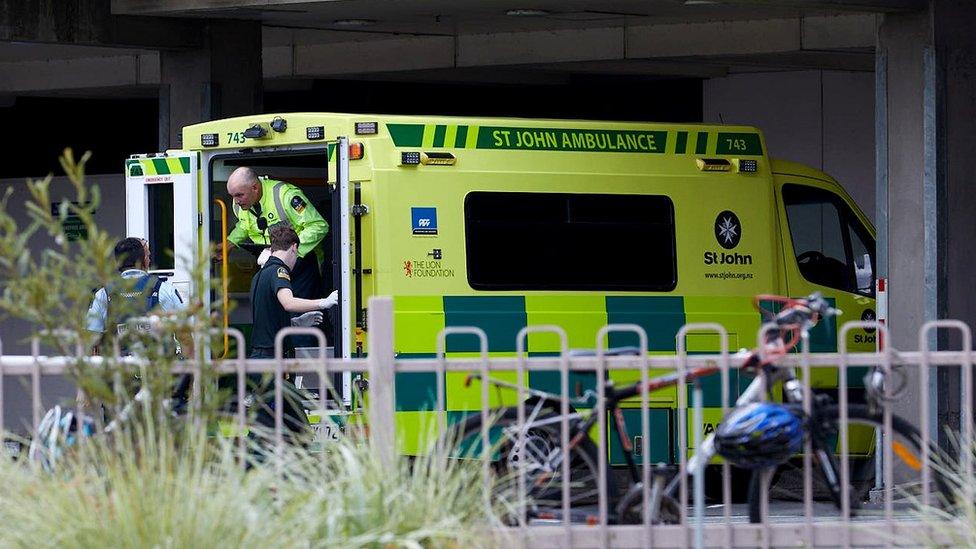
- Published20 March 2019
